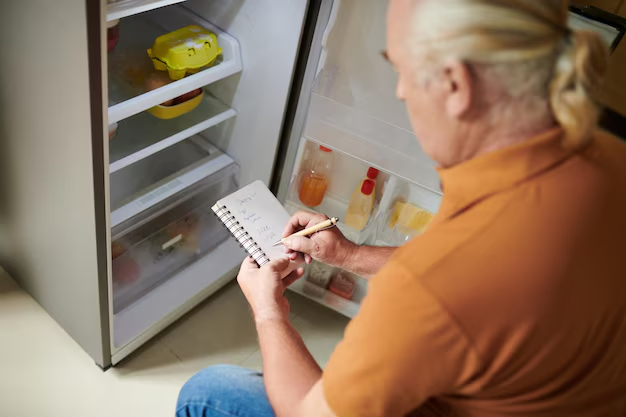How Long Can You Safely Store Cooked Meat in the Refrigerator?
When planning meals, many of us are keen to cook in bulk and store leftovers for convenience. Cooked meat often becomes part of that plan, offering nutritious and delicious options that can be easily reheated. However, a common question arises — how long is it safe to store cooked meat in the refrigerator? Understanding this can be crucial not only for maintaining the quality of your meals but also for ensuring food safety. Let's explore this topic and provide useful guidance for confidently managing your cooked meat leftovers.
🥩 Why Proper Storage Matters
Before diving into the specific timeframes for storing cooked meat, it's important to understand the significance of proper storage. Storing cooked meat appropriately in the refrigerator helps minimize the risk of foodborne illnesses caused by bacteria such as Salmonella and Listeria. Here’s why:
Preserving Quality: The taste, texture, and nutritional content of cooked meat are best maintained when stored correctly. This ensures that each meal is as enjoyable and wholesome as possible.
Preventing Spoilage: Cooked meat has a limited shelf life even in the refrigerator, and proper storage techniques can help prevent spoilage that leads to food waste.
Health and Safety: Bacteria can grow rapidly in cooked meat when it’s left at room temperature. Storing it in the fridge slows down bacterial growth, keeping your food safe to eat.
⏲️ Recommended Refrigeration Timeframes
Different types of cooked meat have varied refrigeration life spans. Below is a general guide to help you ensure your leftovers remain safe to consume.
Poultry (Chicken, Turkey)
- Refrigeration Time: 3 to 4 days
- Tips: Store in shallow, airtight containers or wrap tightly in aluminum foil or plastic wrap to prevent exposure to air and absorb any smells from other foods.
Beef and Pork
- Refrigeration Time: 3 to 4 days
- Tips: Slice large cuts into smaller portions to cool them quickly and store them in airtight containers or heavy-duty freezer bags.
Fish and Seafood
- Refrigeration Time: 1 to 2 days
- Tips: Due to higher spoilage rates, it’s best to consume cooked fish and seafood within this tighter timeframe and ensure they are thoroughly wrapped.
Processed Meats (Sausage, Deli Meats)
- Refrigeration Time: 3 to 5 days
- Tips: Store in their original packaging if unopened, or tightly wrap in plastic wrap or aluminum foil after opening.
🧊 Proper Storage Techniques
Quick Cooling
After cooking, let the meat cool slightly but transfer it to the fridge before it sits out for two hours. This quick cooling method prevents bacteria from multiplying. For larger portions, use ice baths to speed up the cooling process before refrigerating.
Airtight Containers
Using airtight containers helps maintain moisture, prevent cross-contamination, and eliminate the absorption of other flavors from the fridge. Glass or BPA-free plastic containers with tight-fitting lids are optimal choices.
Labeling
Label containers with the type of meat and the date it was cooked. This not only helps to keep track of how long the item has been stored but also organizes your refrigerator so you can prioritize consumption.
📋 Key Takeaways for Safe Meat Storage
To help you quickly recall the essential points of cooked meat storage, here's a visually distinct summary:
🗓️ Timeframes:
- Poultry: 3-4 days
- Beef/Pork: 3-4 days
- Fish/Seafood: 1-2 days
- Processed Meats: 3-5 days
🌀 Storage Practices:
- Use airtight containers.
- Label and date all your meats.
- Transfer to the fridge within 2 hours of cooking.
❄️ For Long-Term Storage: Consider freezing.
🥶 Extending Shelf Life with Freezing
If you're unsure about consuming your cooked meat within these recommended timeframes, freezing is a viable option to extend its shelf life.
Freezing Tips
Optimal Freezing: Cool the meat completely in the refrigerator first, then transfer it to freezer-safe bags or containers. Be sure to remove as much air as possible to prevent freezer burn.
Label with Details: As with refrigerator storage, label your frozen meats with the type and date to maintain transparency on freshness.
Thawing: When ready to use, thaw frozen cooked meat in the refrigerator and consume it within 24 hours after thawing for the best quality and safety.
🌡️ Temperature and Safety Considerations
The integrity and safety of stored cooked meat largely depend on temperature management. Refrigerators should ideally maintain a temperature of 40°F (4°C) or lower. Regularly check and adjust your fridge settings, especially during seasonal changes when ambient temperatures may fluctuate.
Avoiding Temperature Abuse
- Temperature Abuse refers to keeping cooked meat between 40°F (4°C) and 140°F (60°C) for extended periods, which can promote bacterial growth.
- Make the most of quality refrigerator thermometers to monitor your appliance’s temperature accurately.
🚫 Common Mistakes to Avoid
- Keeping meats in the refrigerator door, where temperatures vary each time the door opens.
- Leaving cooked meat on the counter for extended days, which diminishes not only safety but also taste and texture.
- Forgetting to label, resulting in unidentified and potentially unsafe consumption.
🍽️ Practical Tips for Meal Prep Enthusiasts
Meal prepping with cooked meat can make daily cooking hassle-free. Here are practical tips for enthusiasts who want to integrate this practice safely:
Invest in Quality Storage Solutions
- Prioritize purchasing high-quality storage containers that offer airtight sealing to ensure longevity and freshness.
Plan and Portion
Plan your meals for the week and portion your cooked meats accordingly. This helps prevent waste and maintains safety, only defrosting the amount needed per meal to minimize spoilage risk.
Set Reminders
To utilize your cooked and stored meats efficiently, set digital reminders about the upcoming use-by dates. Apps or calendar alerts can be helpful tools.
Understanding how to manage cooked meat storage effectively empowers you to extend the life of your meals and minimize waste. By following these guidelines, you'll have confidence in the safety and quality of the foods you love, ensuring every delicious bite is enjoyed to its fullest!

